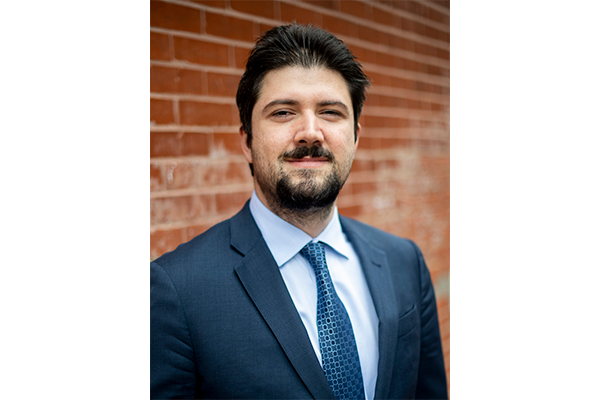Restuccia Receives ONR YIP Award for 6G Spectrum Dominance

ECE Assistant Professor Francesco Restuccia was awarded an Office of Naval Research Young Investigator Program Award for “Polymorphic Wireless Computing for Ultra-Wideband 6G Spectrum Dominance.”
Francesco Restuccia, assistant professor of electrical and computer engineering (ECE) and member of the Institute for the Wireless Internet of Things and the Roux Institute, has been awarded an Office of Naval Research Young Investigator Program Award for his work on next-generation computing strategies that could help facilitate the technological leap needed to enable 6G wireless networks. This ONR award is a highly competitive early-career award program where prior academic achievement and potential for significant scientific breakthrough are key elements of the evaluation criteria.
“Over the next 10 years, we need to make a substantial jump in technology to push the envelope on our interaction with the technological world,” says Restuccia. “We need to find the right tradeoff between our communication needs and the computational capabilities of our devices in order to make 6G a reality.”
Restuccia’s new paradigm would enable real-time, autonomous modification of the communication network based on user and device needs. For example, if a user is completing a task that requires more data, the network would self-adapt to sacrifice some computational speed; or to consume less energy, it would lower the device’s upload speed.
Restuccia’s approach would use dynamic neural networks, a concept that is in its infancy as researchers work to mimic what humans do daily: adapting and creating new neural connections as we learn. The groundbreaking aspect of Restuccia’s research is employing these networks in a new way.
“Dynamic neural networks aren’t currently being used in this context,” says Restuccia. “This concept is not just an algorithm, but an algorithm plus a wireless network plus an embedded computational system—that’s what makes this work unique and challenging.”
The algorithms for such real-time computations will require collecting, training, and testing a great deal of data, which Restuccia and his research team will be able to accomplish at Northeastern’s Institute for the Wireless Internet of Things, which has unique capabilities to perform the extensive experimental evaluation in realistic use-case scenarios.
“Northeastern students and postdocs will be a fundamental piece of this project as they design and implement the algorithms and the end-to-end 6G system,” says Restuccia. “Luckily the award is very generous, so the resources are going to be a great help in not only forming an interdisciplinary team with computer science, computer engineering, and wireless expertise, but also in mentoring and producing graduates who possess this very rare—but very important—intersection of skills.”
For Restuccia, the importance of 6G and the terabit-per-second communication links it will permit is paramount to the future of society.
“6G networks are going to radically transform the way we interact with one another and the surrounding world,” says Restuccia. “It represents critical technology to enable things such as the Metaverse, which will radically change the way we live. Things that are a dream today—such as real-time surgery from across the planet—will be possible thanks to an unprecedented convergence of computation and communication.”
Restuccia is one of only 25 researchers in the United States to share nearly $17.5 million in funding to conduct innovative scientific research that will benefit science and technology for the U.S. Navy and Marine Corps.
Award Abstract: Achieving technological dominance in 6G wireless networks is of fundamental strategic importance to the economic well-being of the United States. To concretely deploy terabit-per-second communication links, fundamental research breakthroughs are needed to rethink how computing will be conducted in 6G wireless systems. To this end, this project will lay the foundations of a new paradigm named polymorphic wireless computing. We will research novel techniques that will seamlessly adapt not only the underlying algorithmic structure, but also the hardware and software structure of the 6G wireless platform according to ongoing mission-driven objectives, existing network/spectrum operating conditions, and current performance metrics of interest while being able to operate at several GHz of bandwidth. To this end, we will perform highly interdisciplinary research at the intersection of machine learning, embedded systems, wireless networking, and wireless security. To reduce our research to practice, we will prototype our techniques on software-defined radio platforms equipped with reconfigurable hardware; and leverage unique state-of-the-art facilities at Northeastern University to perform the extensive experimental evaluation in realistic use-case scenarios.